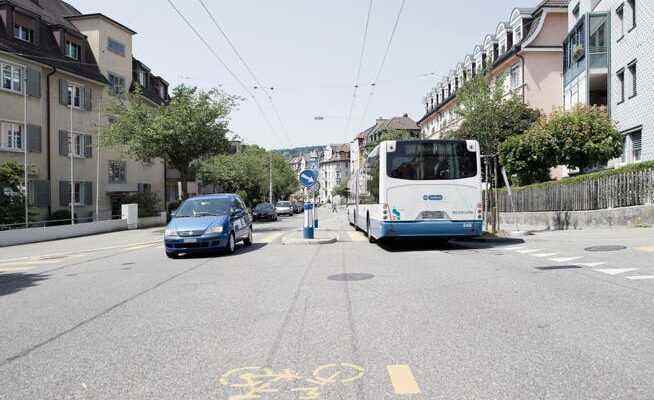If the 30 km/h speed limit is “largely” introduced in Zurich, public transport will increase by around 15 million francs a year. Because the canton is blocking, the city is paying for it “for the time being”.
Tempo 30 slows down not only the cars, but also the vehicles of the Zurich public transport company. It is not clear who will pay the additional costs.
30 km/h not only slows down cars, but also trams and buses. In order to be able to maintain the offer anyway, the Zurich Transport Authority (VBZ) needs more vehicles and more staff. That’s in the money. If Tempo 30 is “largely” introduced in the city, as the city council wants, the annual additional costs should amount to around 15 million francs.
38 as an example
For some time, the city and the higher-level Zurich Transport Association (ZVV) have been arguing about who should bear these additional costs. The cantonal transport association is of the opinion that the additional costs should be compensated for by eliminating other offers. He does not want to provide additional money.
This was demonstrated using the example of bus route 46. The original idea was to compensate for the additional costs for the 46 bus by eliminating the 38 district bus in Höngg. However, the Zurich city council decided to continue operating this line as well. That costs around 1.5 million Swiss francs, calculated over the timetable period of two years.
Because the transport association refused to bear these costs, the city advanced the money, but at the same time appealed against the decision to the Zurich government council. The case is still pending there. The decision is of great importance, as it should clarify in an exemplary manner whether the transport association or the municipality must assume the additional costs incurred by 30 km/h.
Although the question has not yet been answered, the Zurich City Council is now moving forward and submitting a draft regulation to Parliament that is intended to regulate the provisional assumption of the additional costs for further 30 km/h routes. Thanks to this ordinance, the VBZ no longer have to submit a separate application for each individual case. The additional costs would then simply be listed in the budget and approved by the municipal council.
“Maintain the attractiveness of public transport”
In the future, it will probably no longer be so easy to assign the additional costs to a single Tempo 30 measure, says the responsible city councilor Michael Baumer on request. Because of the introduction of Tempo 30 in various places, the entire timetable concept would have to be looked at and changed where necessary. This is another reason why the route via the regulation makes sense.
The city is committed to temporarily financing the additional costs for attractive and efficient public transport, according to the statement by the Zurich city council. This included punctuality, a dense network in the districts and attractive travel times. So that there is no loss of performance due to 30 km/h, the city will assume the additional costs for the time being.
The SVP sharply criticizes the actions of the city council. She has submitted a popular initiative against 30 km/h on main traffic routes. Until this initiative has been voted on, the city council should not decide on any new 30 km/h routes. Anything else is undemocratic. In this sense, the application to the municipal council must also be withdrawn.
